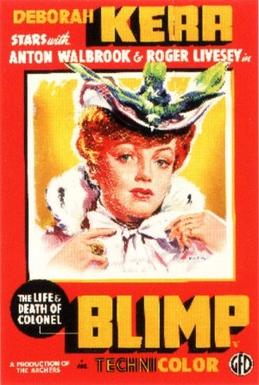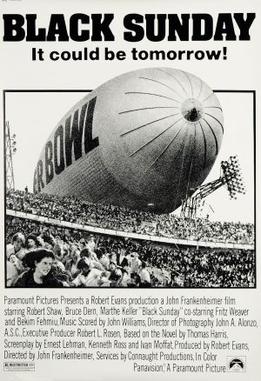
A blimp, or non-rigid airship, is an airship (dirigible) without an internal structural framework or a keel. Unlike semi-rigid and rigid airships, blimps rely on the pressure of the lifting gas inside the envelope and the strength of the envelope itself to maintain their shape.

Colonel Blimp is a British cartoon character by cartoonist David Low, first drawn for Lord Beaverbrook's London Evening Standard in April 1934. Blimp is pompous, irascible, jingoistic, and stereotypically British, identifiable by his walrus moustache and the interjection "Gad, Sir!"
SS is an abbreviation for Schutzstaffel, a paramilitary organisation in Nazi Germany.

Reginald Tate was an English actor, veteran of many roles on stage, in films and on television. He is remembered best as the first actor to play the television science-fiction character Professor Bernard Quatermass, in the 1953 BBC Television serial The Quatermass Experiment.

Roger Livesey was a British stage and film actor. He is most often remembered for the three Powell & Pressburger films in which he starred: The Life and Death of Colonel Blimp, I Know Where I'm Going! and A Matter of Life and Death. Tall and broad with a mop of chestnut hair, Livesey used his highly distinctive husky voice, gentle manner and athletic physique to create many notable roles in his theatre and film work.

The Life and Death of Colonel Blimp is a 1943 British romantic drama war film written, produced and directed by the British film making team of Michael Powell and Emeric Pressburger. It stars Roger Livesey, Deborah Kerr and Anton Walbrook. The title derives from the satirical Colonel Blimp comic strip by David Low, but the story itself is original. One film critic has described it as "England's greatest film ever" and it is renowned for its sophistication and directorial brilliance as well as for its script, the performances of its large cast and for its pioneering Technicolor cinematography. Among its distinguished company of actors, particular praise has been reserved for Livesey, Walbrook and Kerr.

The British film-making partnership of Michael Powell (1905–1990) and Emeric Pressburger (1902–1988)—together often known as The Archers, the name of their production company—made a series of influential films in the 1940s and 1950s. Their collaborations—24 films between 1939 and 1972—were mainly derived from original stories by Pressburger with the script written by both Pressburger and Powell. Powell did most of the directing while Pressburger did most of the work of the producer and also assisted with the editing, especially the way the music was used. Unusually, the pair shared a writer-director-producer credit for most of their films. The best-known of these are The Life and Death of Colonel Blimp (1943), A Canterbury Tale (1944), I Know Where I'm Going! (1945), A Matter of Life and Death (1946), Black Narcissus (1947), The Red Shoes (1948), and The Tales of Hoffmann (1951).
N class or Class N may refer to:
K class or Class K may refer to:
Alfred Junge was a German-born production designer who spent a large part of his career working in the British film industry.

Ursula Jean McMinn, better known as Ursula Jeans, was an English film, stage, and television actress.

Black Sunday is a 1977 American action thriller film directed by John Frankenheimer and based on Thomas Harris' novel of the same name. It was produced by Robert Evans, and stars Robert Shaw, Bruce Dern and Marthe Keller. It was nominated for the Edgar Allan Poe Award in 1978. The screenplay was written by Ernest Lehman, Kenneth Ross and Ivan Moffat. Ross had previously written the screenplay for The Day of the Jackal, a similar plot-driven political thriller. The inspiration of the story came from the Munich massacre, perpetrated by the Black September organization against Israeli athletes at the 1972 Summer Olympics, giving the title for the novel and film.
A blimp is an airship without an internal supporting framework or keel.
Sarah Chatfield is an English music video director, based in London and Los Angeles. She is represented by UK production company Kode. Her video for Lily Allen's single Alfie, earned her Best New Director and Best Pop video at the CAD awards. Music videos directed by Chatfield include Lykke Li, Lenka, Leah LaBelle ("Sexify"), Kelly Rowland ("Motivation") and The Saturdays.

Blink is a British production company and creative studio producing commercials, music videos, short films, branded content, and long-form entertainment. It is composed of Blink Productions, Blink Ink, Blink Art, and Blink Industries. The company's head offices are based in Soho, London. Blink is headed by managing director, James Studholme, and represents a total of 48 directors and artists across its five divisions.
This page is based on this
Wikipedia article Text is available under the
CC BY-SA 4.0 license; additional terms may apply.
Images, videos and audio are available under their respective licenses.








